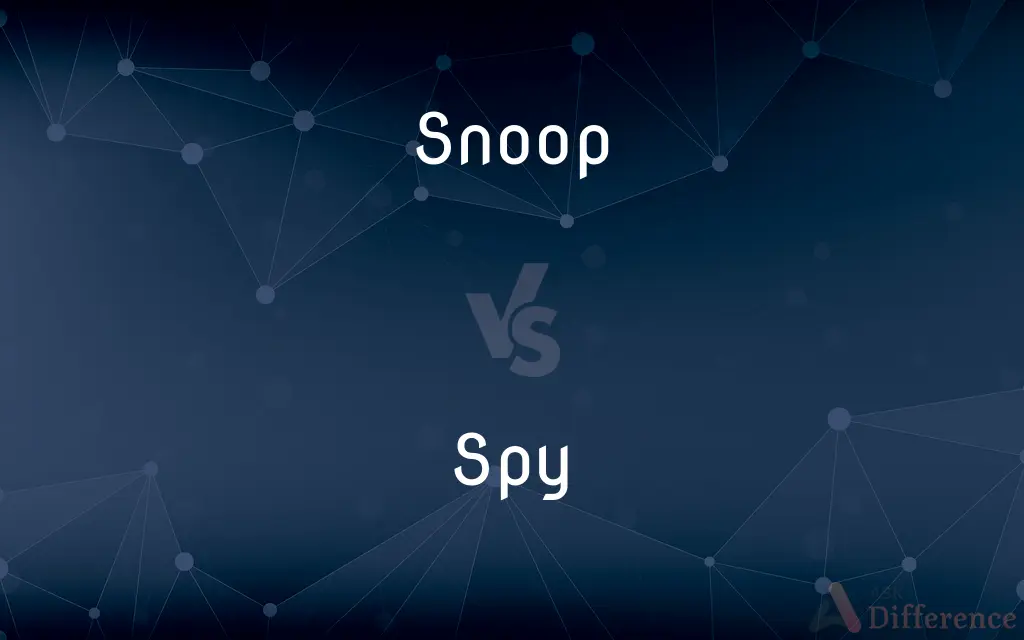Snoop vs. Spy — What's the Difference?
By Tayyaba Rehman & Urooj Arif — Updated on April 2, 2024
Snoop involves nosy or intrusive observing, focusing on curiosity or minor secrets, while spying is gathering information covertly, often for strategic purposes.

Difference Between Snoop and Spy
Table of Contents
ADVERTISEMENT
Key Differences
Snooping is characterized by a casual or personal curiosity aiming to uncover secrets or private information without explicit permission. It's often driven by personal interest or nosiness. On the other hand, spying is a deliberate act of surveillance or information gathering, typically conducted for strategic, political, or security reasons. It involves careful planning and is often executed by professionals or governmental agencies.
Snoops tend to operate alone or in informal settings, driven by gossip or personal vendettas. They might rummage through someone's belongings or eavesdrop on conversations without a broader agenda. Whereas spies operate within an organized framework, their activities are part of larger intelligence operations aimed at gathering critical information that could influence national security, corporate strategies, or geopolitical dynamics.
The tools and methods used in snooping are generally simplistic, such as listening through doors or peeking into windows. Snooping lacks the sophistication of spying, which employs advanced technologies like surveillance cameras, hacking into digital communications, and other espionage equipment.
While snooping can sometimes lead to legal or ethical dilemmas, it rarely involves the level of risk or legal repercussions associated with spying. Spying, especially on a national or corporate level, can lead to significant legal consequences, including charges of treason, espionage, and other serious crimes.
The motivations behind snooping are typically rooted in curiosity, jealousy, or personal gain, such as finding out if a partner is unfaithful. In contrast, spies are motivated by duty, patriotism, or financial compensation, focusing on the acquisition of information that serves a specific purpose or mission.
ADVERTISEMENT
Comparison Chart
Purpose
Personal curiosity or minor secret uncovering
Strategic information gathering for political, security, or corporate reasons
Context
Informal, often driven by nosiness or personal interest
Formal, often part of an organized intelligence operation
Methods
Simple, e.g., eavesdropping, rummaging through belongings
Advanced technologies, e.g., surveillance cameras, digital hacking
Risks & Consequences
Minimal, mostly ethical or privacy concerns
High, including legal repercussions like espionage charges
Motivation
Curiosity, personal gain, or jealousy
Duty, patriotism, or financial compensation
Compare with Definitions
Snoop
To investigate or look around furtively in an attempt to find out something, especially private or confidential information.
She was caught snooping around her coworker's desk.
Spy
A person employed by a government or other organization to secretly obtain information on an enemy or competitor.
The spy gathered intelligence on military installations.
Snoop
An individual who snoops.
He became known as the neighborhood snoop.
Spy
Someone who observes secretly with hostile intent.
A spy infiltrated the political campaign team.
Snoop
The act of prying into someone's private affairs without their consent.
His snooping got him into trouble with his friends.
Spy
The act of spying, which involves secret observation or gathering of data.
Spying on rival companies became a routine part of his job.
Snoop
To move stealthily in order to achieve the aforementioned goals.
She snooped through the diary quietly.
Spy
To secretly watch the actions of a person or organization to gather information.
She was tasked to spy on the ambassador.
Snoop
Engaging in casual or unsanctioned surveillance.
They were snooping on the conversation from the next room.
Spy
The use of espionage techniques for intelligence purposes.
The agency is involved in global spy operations.
Snoop
To pry into the private affairs of others, especially by prowling about.
Spy
One who secretly collects information concerning the enemies of a government or group.
Snoop
One who snoops.
Spy
One who secretly collects information for a business about one or more of its competitors.
Snoop
To be devious and cunning so as not to be seen.
Spy
One who secretly keeps watch on another or others.
Snoop
To secretly spy on or investigate, especially into the private personal life of others.
If I had not snooped on her, I wouldn't have found out that she lied about her degree.
Spy
To watch or observe secretly
Was sent to spy out the enemy camp.
Snoop
The act of snooping
Spy
To discover by close observation
"[They] are continually prowling about on all three decks, eager to spy out iniquities" (Herman Melville).
Snoop
One who snoops
Be careful what you say around Gene because he's the bosses' snoop.
Spy
To catch sight of; see
Spied the ship on the horizon.
Snoop
A private detective
She hired a snoop to find out if her husband was having an affair.
Spy
To engage in espionage.
Snoop
A spy who makes uninvited inquiries into the private affairs of others
Spy
To investigate or observe something, especially in secret
Spying into the neighbor's activities.
Snoop
Watch, observe, or inquire secretly
Spy
A person who secretly watches and examines the actions of other individuals or organizations and gathers information on them (usually to gain an advantage).
Spy
(intransitive) To act as a spy.
During the Cold War, Russia and America would each spy on each other for recon.
Spy
(transitive) To spot; to catch sight of.
I think I can spy that hot guy coming over here.
Spy
(intransitive) To search narrowly; to scrutinize.
Spy
(transitive) To explore; to see; to view; inspect and examine secretly, as a country.
Spy
To gain sight of; to discover at a distance, or in a state of concealment; to espy; to see.
One, in reading, skipped over all sentences where he spied a note of admiration.
Spy
To discover by close search or examination.
Look about with your eyes; spy what things are to be reformed in the church of England.
Spy
To explore; to view, inspect, and examine secretly, as a country; - usually with out.
Moses sent to spy out Jaazer, and they took the villages thereof.
Spy
To search narrowly; to scrutinize.
It is my nature's plagueTo spy into abuses.
Spy
One who keeps a constant watch of the conduct of others.
Spy
A person sent secretly into an enemy's camp, territory, or fortifications, to inspect his works, ascertain his strength, movements, or designs, and to communicate such intelligence to the proper officer.
Spy
(military) a secret agent hired by a state to obtain information about its enemies or by a business to obtain industrial secrets from competitors
Spy
A secret watcher; someone who secretly watches other people;
My spies tell me that you had a good time last night
Spy
Catch sight of
Spy
Watch, observe, or inquire secretly
Spy
Secretly collect sensitive or classified information; engage in espionage;
Spy for the Russians
Common Curiosities
What is the main difference between a snoop and a spy?
The main difference lies in their purposes: snooping is driven by personal curiosity or nosiness, while spying is for gathering information covertly, often for strategic reasons.
Can snooping ever be considered spying?
Yes, if snooping involves gathering sensitive or strategic information without permission, it can be considered a form of spying.
Can anyone be a snoop?
Yes, anyone with a curious nature can snoop, but it typically lacks the formal training and objectives of espionage.
Is spying always illegal?
Not always; spying can be legally sanctioned by governments for national security purposes, but unauthorized spying is illegal.
What motivates people to spy?
Motivations include duty, patriotism, financial compensation, or coercion.
How can someone tell if they are being spied on?
Signs include unusual activity on digital devices, unexplained presence of new objects, or feeling watched.
Are the methods used by snoops and spies different?
Yes, snoops typically use simple methods like eavesdropping, while spies use advanced technologies and sophisticated techniques.
What are the risks associated with snooping and spying?
Snooping might lead to ethical or privacy issues, whereas spying carries significant legal risks, including espionage charges.
Are spies always associated with governments?
No, spies can also work for private organizations, corporations, or even non-state actors.
Can technology protect against snooping and spying?
Yes, encryption, secure networks, and privacy tools can help protect against unauthorized surveillance.
What is the historical significance of spying?
Spying has played a crucial role in geopolitical strategy, military planning, and diplomatic negotiations throughout history.
What legal protections exist against unwarranted snooping or spying?
Laws vary by country but often include privacy legislation, anti-surveillance laws, and restrictions on data collection.
How do spies communicate securely?
Spies use encrypted communications, covert signals, and sometimes, couriers to avoid detection.
How do intelligence agencies justify spying?
Agencies often cite national security, the prevention of crime, and the protection of economic interests as justifications.
What is the difference in training between a snoop and a spy?
Snoops generally lack formal training, while spies often undergo extensive preparation in surveillance, technology, and sometimes combat.
Share Your Discovery

Previous Comparison
Possible vs. Available
Next Comparison
Principle vs. EmotionAuthor Spotlight
Written by
Tayyaba RehmanTayyaba Rehman is a distinguished writer, currently serving as a primary contributor to askdifference.com. As a researcher in semantics and etymology, Tayyaba's passion for the complexity of languages and their distinctions has found a perfect home on the platform. Tayyaba delves into the intricacies of language, distinguishing between commonly confused words and phrases, thereby providing clarity for readers worldwide.
Co-written by
Urooj ArifUrooj is a skilled content writer at Ask Difference, known for her exceptional ability to simplify complex topics into engaging and informative content. With a passion for research and a flair for clear, concise writing, she consistently delivers articles that resonate with our diverse audience.














































